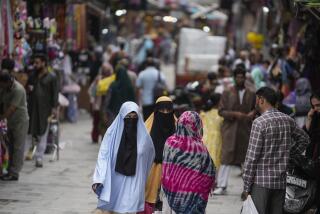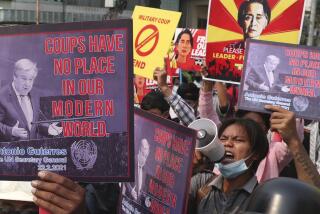Nepal forms caretaker government pending new elections
- Share via
KATMANDU, Nepal — Nepal announced the formation of a caretaker government Tuesday and settled into a tense calm after a weekend constitutional crisis led the prime minister to call elections, some four years and several shaky governments after the country set out to write its crucial, if elusive, national blueprint.
But it wasn’t clear whether the caretaker government would survive until the Nov. 22 election, after three allies left the ruling coalition Monday amid calls for Prime Minister Baburam Bhattarai’s resignation.
The political crisis was sparked when the deadline to draft a new constitution passed Sunday as parties battled over whether to divide states along ethnic lines under a federalist system, an issue that has led to violent protests in recent weeks.
Many minorities feel their interests have been undermined for centuries by a cabal in and around the Katmandu Valley and see the constitution as their best opportunity to right perceived wrongs.
Nepal, wedged between India and China, abolished its Hindu monarchy and became a republic in 2006 after a decade of armed conflict but has lurched from one political crisis to the next ever since.
“If the constitution is delivered without ethnic federalism, I’m sure it will result in conflict,” said Ram Devkota, 32, a member of the elite priest caste from Katmandu, the capital. “I am Brahmin, but I understand that the ethnic minorities must have some rights now. They have been historically oppressed and enslaved. That’s why they are angry.”
Others say the idea of dividing states along ethnic lines is unworkable given that different groups migrated to different areas — notably Nepal’s southern Terai region — at different times bearing different claims.
“I don’t know how you set boundaries in a population that’s so mixed up,” said Smruti Pattanaik, a research fellow at New Delhi’s Institute for Defense Studies and Analyses, a think tank. “But the issue has become intense. Every group feels this is their last chance.”
Though a November election could help break the impasse and lead to a consensus on the thorny federalism issue, it’s more likely the stalemate will drag on, analysts said. They note the deep-seated divisions between low and high caste communities, ethnic groups, poor farmers and wealthy Katmandu residents, and Maoists and those sympathetic to the former monarchy.
“On principal, a fresh election is a good thing,” said Hari Phuyal, a Katmandu-based lawyer and host of a public affairs TV program. “But the reality could be very ugly.”
Most hurt by the political muddle — and among the most disenchanted — are Nepal’s poorest citizens, as local government slows to a crawl, economic development is delayed, and disputes are settled by political thugs rather than courts.
“What will this constitution do for me?” asked a farmer from Nepal’s mid-western Bardiya district who asked not to be identified. “Will it dig my fields? Will it cook my rice?”
Though Bhattarai’s ruling Maoist party has gotten much of the blame for the latest crisis — for, among other things, failing to consult with other parties before calling the elections and for dissolving the Constituent Assembly charged with writing the constitution — there’s more than enough blame to go around, some say.
“All the major parties are at fault,” said S. Chandrasekharan, New Delhi-based director of the South Asia Analysis Group. “It’s been a total failure.”
That said, there are modest signs of progress on Nepal’s winding road to democracy. Former Maoist guerrillas have been largely disarmed and integrated into the armed forces, another hugely contentious issue. And weeks of protests, strikes and violence surrounding the ethnicity debate seem to have eased, at least temporarily, said Sarah Levit-Shore, the Atlanta-based Carter Center’s representative in Nepal, although this may be out of collective exhaustion.
Ultimately, however, the same politicians embroiled in endless power struggles could be Nepal’s best hope for resolving the crisis.
“The credibility of the parties is seriously damaged,” said Anagha Neelakantan, senior analyst with the International Crisis Group in Katmandu, “but they are the ones who have to revive this process. They need to demonstrate commitment and work together, and give people a reason to trust them again.”
Special correspondent Knight reported from Katmandu and Times staff writer Magnier reported from New Delhi.
More to Read
Sign up for Essential California
The most important California stories and recommendations in your inbox every morning.
You may occasionally receive promotional content from the Los Angeles Times.










